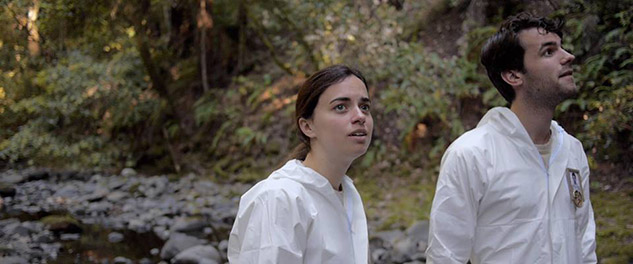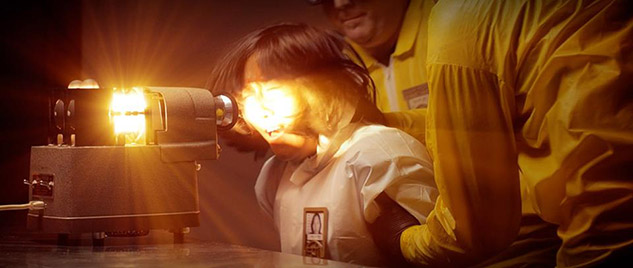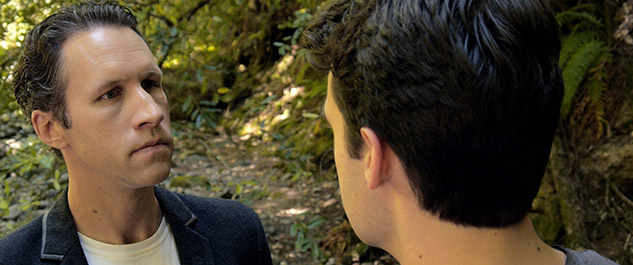The Film
The original script, written by Feldman and his coproducer husband, Britton Watkins, tackles how eponymous Senn copes with bleak circumstances living under the heel of institutionalized injustice. North Korean three-generation prison camps were an inspiration and reference. How do the hopeless find hope? How do the downtrodden look beyond the circumstances into which they are born? What does it take to escape a doomed existence? How much courage does it take to face the ambiguous, the overwhelming?
Senn’s mind-numbing existence is governed by stifling corporate rules—workers live in fear of being “delisted,” a fate as bad as death. Senn’s best friend, Resh, copes with their toxic world by breaking the rules as often and as cunningly as possible. Tragically, they know there is a universe beyond theirs, but brutal corporate control makes it pointless to strive for.
When Senn begins to experience waking dreams that he doesn’t understand he feels tested and starts to question his sanity. His lover Kana, who has had her family taken from her by the profit-driven whims of the planet’s owners, worries that she may lose Senn too.
The stakes are personal, but become profound as an ancient, alien intelligence reveals that Senn’s life is of cosmic importance, and that he is destined to help reweave the fabric of civilization.

Q&A with the Filmmakers
What do you think most sci-fi fans will find most interesting and enjoyable about your film?
Feldman: Hopefully they will be intrigued by the puzzles we’ve tried to present, be entertained by the humor, and think deeply about the ideas in the film. Will they come away changed? Or with their eyes and minds opened a bit wider? Who knows, but I can dream….
The film has been widely praised for its cinematic artistry, how did you achieve that?
Feldman: My background is in graphic design, and I think the sense of balance, form, tone and white space that I try to bring to my graphic work inform and influence my filmmaking—how I set up a shot or plan out a sequence. We were also lucky that the state of DSLRs and digital tools has gotten to the point that cinema-level quality is possible with very inexpensive equipment.
Watkins: To my delight, Josh was a fan of the idea to create an authentic, bespoke language for Senn’s world. The language that our characters ostensibly speak and the only one that the viewer sees on screen is a grammatically accurate “constructed language” with its own lexicon, syntax, etc. As texture in our film, it’s similar to the Klingon language that I taught to Zoë Saldana and the other denizens of Kronos in JJ Abrams’ Star Trek Into Darkness. Creating a language was a very inexpensive way to increase the production value and “sci-fi cred” of our film. An 80 page pdf all about the language can be downloaded here.
Unlike a lot of low-budget films, and even some high-budget ones, the language of Pyom is not just gibberish. We hope that adds to the authenticity of this world. Their written language is one of the “in-world systems” we established for the film. Consonants and vowels are written on different lines in their alphabet. So the corporate bureaucracy’s reusable name plaque, used while taking badge photos, was designed to follow this in- world logic. Creating the language was a filmmaking experiment, but we think an interesting one. By doing it, we give everyone in the audience a taste of impenetrability. Hopefully it’s fodder for inquisitive minds.

Feldman: The mere existence of a state like North Korea; Chinese factory workers that don’t understand the objects they’re making; individuals having everything they’ve been taught contradicted; worldview formation, destruction; people who question everything vs. those who question nothing; the randomness of the universe; understanding or not understanding cultures that aren’t our own: they’re all perplexing, and I grapple with understanding them in my everyday life.
In general though, the movie explores how individuals navigate the world they’re born into, and the choices that have been made for them.
Watkins: I’d like to add that it was challenging for us—living in a comparatively free, 21st century California—to imagine exactly what it would mean to be born and raised on Pyom. It’s an environment akin to Nineteen Eighty-Four. The corporation that owns Pyom is too indifferent to its “employees” to even police them, but if they discover anyone causing a problem—they’re happy to brainwash him or her for it. Senn, Kana, and Resh are also unprotected from the collateral environmental devastation of their world. How would you motivate yourself in that kind of place? How would it affect relationships? Would a person trapped on that world imagine escaping, or would that slim hope be too painful? It’s easier to ponder than to answer.
You’ll also note references to insects. I’ve always found the question of whether “ants know that bees fly,” fascinating. Humans, ants and bees are all eusocial; creatures for whom social lives and hierarchies are central. Still, while we share this key similarity, we are all radically different and pragmatically unaware of and indifferent to each others’ presence. How can that be? What does that mean in the bigger picture of existence?





— GWYNNE WATKINS, YAHOO MOVIES
— JAMIE HALL, FRAKING FILMS

